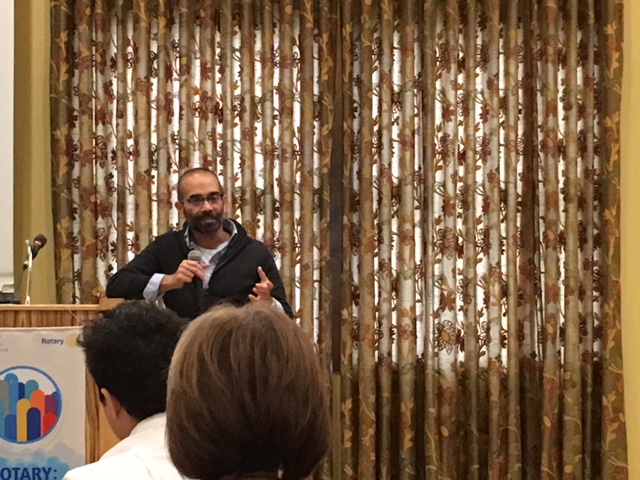Reported by Patrick Van Haren
Past President Harold Ingersoll introduced Ashish Gadnis of BanQu (banquapp.com) who gave a lively high-level presentation on the disruptive technology called Blockchain and the humanitarian case for enabling bitcoin around the world.

Ashish shared with us his stories of growing up in a ration card lifestyle in India, and how that gave him insights to the plight of more than 67 million refugees around the world today. Ashish explained the problems of people who exist, but do not have a record of transactions that they as individuals can access or monetize.
He specifically spoke about a woman farmer in the Congo and the inability of the local bank to recognize her (and thus to open a bank account), despite her accomplishments and credentials. The receipts of her utility payments, pay stubs or rent receipts are not accepted. She exists in a one-sided world in which ‘others’ collect her data.
Blockchain is a distributed ledger technology in which individuals can own and access a digital copy of all of their transactions. When a transaction occurs, as many as 5,000 computers will record the transaction. It cannot be modified unless a percentage of the computers and their owners agree to the change (i.e. usually 51%) which is quite difficult to achieve.
BanQu is now in 5 countries and has 10,000 people with a Bitcoin identity (an application of Blockchain). This is the first step in a process to give them equal rights, similar to the ability to get their own credit card. If they can prove their history, then they can monetize that (i.e. get a credit card). This can enable someone to start bypassing the extraordinary interest rates (i.e. 40%+) charged for cash and/or micro-loans by their local banks.
Ashish joked that if you give all women access to finance, all of our problems will go away. Blockchain’s disruptive impact can benefit those who most underserved. Refugees who cannot access their education credentials will have better chances to escape refugee camps, for example, in which the average time spent is 17 years.
This is because a biometric profile can be attached to their bitcoin account for when they do not have access to their digital security key (vs. a public viewing key). This process can link medical files, financial records, education, etc. and help reverse the exploitation of the poor — it enables dignity versus non dignity. This is disruptive to existing control situations, but progress is being made with those who want the socio-economic data of these people as new markets. BanQu is approaching corporations who want to know more about their customers.

